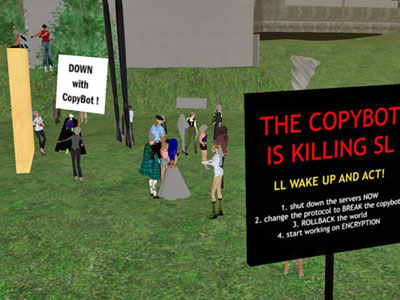
I've mentioned Second Life, an online virtual world, in a previous blog.
CNET reports that its burgeoning economy faces a threat that will be all too familiar to many in the 'real' world. [edited]
Linden Lab, which publishes Second Life, posted a blog alerting residents of the virtual world to the existence of a program called CopyBot, which allows someone to copy any object in Second Life. That includes goods such as clothing that people purchase for their in-world avatars, and even the virtual PCs that computer giant Dell announced Tuesday it is going to sell in the digital world.
Second Life users can purchase virtual items with a pretend currency called Linden dollars. But they use real-life currency to acquire that virtual coin. In fact, there's an exchange rate between the two: One U.S. dollar will buy 271 Lindens, enough to buy a basic outfit for an avatar, which is the digital representation of a person.
Problem is, it's not clear yet if there's anything Linden Lab can do to stop people from using the bot. Linden Lab said Second Life content creators who had their wares stolen had few immediate options for stopping the thefts and that the best recourse for them could be to file a Digital Millennium Copyright Act complaint - in the real world - against offenders.
Some virtual entrepreneurs now worry their livelihoods are at stake, and some are threatening to shut down their in-world businesses before they get fleeced.
Residents have also complained about other issues, such as problems with the user interface and previous issues related to the security of created content.
To 'Baba Yamamoto', the Second Life name of one of the members of the group that created CopyBot, the uproar over the software is understandable but disappointing.
Yamamoto told CNET News.com that CopyBot was created as a tool for testing and demonstrations and was never intended to be used for illegal theft. But because the tool was created using an open-source license, some Second Life users are now freely using and distributing it.
And many residents are very unhappy about that.
"The essence of the creativity in this world is largely because of creators and their work being protected," Mallon said. "This tool defeats all protection. So if you labour to build a business like we all have, your work can be stolen."
(Thanks to Conrad for the CNET article link)
------------

2 comments:
Whew! That's the 'essence of creativity' in this world?!
I was hoping you'd write more about this yourself, Brett. You should at least refer / link us back to your series on digital rights....
So many of our ideas about ownership are predicated on the gut feeling that "If you get something, then I no longer have it" We've gotten really good at making rules that govern that.
But with electronic media (and with nano assemblers in the future), we face a situation where it copies cost virtually (sorry) nothing. At some point, we need to start identifying the difference between "spreading out the cost of the original" and "artificially holding data for ransom."
This already drove me nuts with the way that some people / companies stockpile patents or squat on URLs they think other people will want or satellite/cable stations bid for things that otherwise would go on non-pay TV.
We need a new system. One which places the value on creating and creators rather than on creations, so that everyone can enjoy the instances of things that can be freely copied, without the people who do the creating going hungry, but without rewarding people who insert themselves in the middle of transactions to deliberately slow them up unless they're paid. Our culture's reliance on Digital Rights and Intellectual Ownership is an attempt to patch a bad system.
Hey, why write about it myself when there are clever people like you to do it for me :-?
Anyone who fancies a trawl through my 'digital ethics' stuff can just type 'digital ethics' into the blog search window, that will give you all the articles on this site, and a link to my old site for the ones before that
i concur with your comments, and do think that the 'new system' will begin to emerge... the problem is that we are in a 'transition phase', where people have no choice but to make money through selling what they create...
just as the industrial revolution meant people changing the way they secured food and shelter, the digital age is ushering in fresh paradigms... at the moment it is mainly on the 'non-essentials', communication and entertainment...
but whether it happens in our lifetime, our childrens', or our childrens' childrens', nanotech is going to make your dream a reality, and a WHOLE HEAP of new problems!
Post a Comment